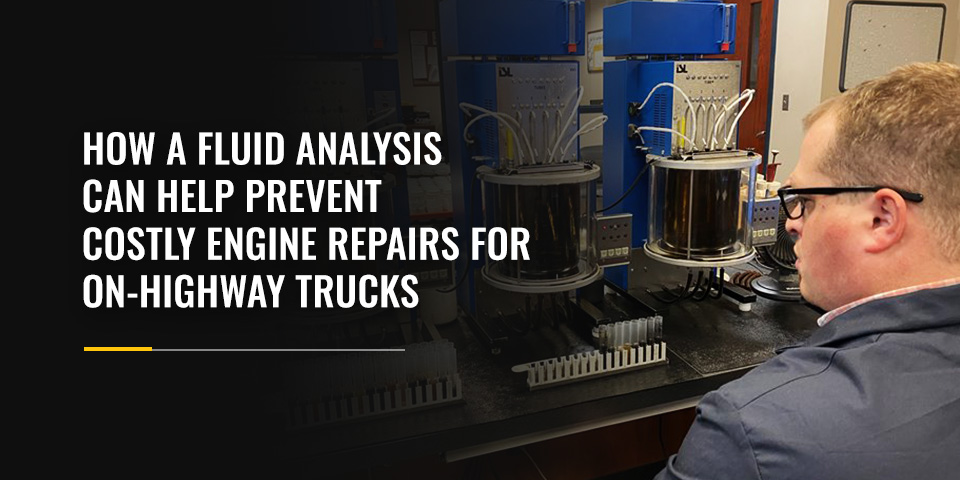

A fluid analysis is an essential part of semi-truck engine maintenance. Testing your fuel, coolant, and oil reveals crucial information about your truck’s safety and performance, enabling you to address issues before they cause further damage.
Fluid tests help technicians detect contaminants, corrosion, and potential engine complications. Ensure fluid analysis is on your diesel engine maintenance checklist to reduce repair costs and extend your truck’s life span.
A semi-truck fluid analysis samples and tests the following fluids:
Testing diesel fuel is essential because low-quality fuel can inhibit your truck’s operation. Diesel fuel sampling ensures fuel is free of contamination and microbial growth, helping it last longer so you can save on maintenance and operating costs. Testing diesel fuel and addressing complications prevents it from wearing down and damaging components, such as:
Oil sampling helps technicians evaluate oil quality and check for contaminants like glycol, water, dirt, or fuel that could hinder your truck’s performance. Testing the oil also helps technicians identify early signs of wear and damage on metal components in the following lubricated systems:
Testing oil in a semi-truck is especially important, as truck engines typically operate under harsh, hot conditions.
Similar to oil, testing coolant is necessary due to the high temperatures and harsh conditions trucks operate under. Technicians sample coolant to ensure your truck has the proper chemical balance for optimal cooling efficiency and protection. Sampling coolant helps technicians assess the following factors:
A fluid analysis reveals different types of contamination so technicians can identify and address specific engine complications. Scheduling a fluid analysis for your truck can help you address the following complications before they cause further wear or damage:
An engine’s internal components can shed metal particles, and a fluid analysis measures the amount of metal in parts per million. Once a fluid test reveals metal contamination, technicians can determine the source of the contamination based on the type of metal present.
For example, iron accumulation can indicate piston ring wear, and copper buildup may indicate a complication with the bearings. The following metals can show up in a fluid analysis:
If a fluid test reveals the presence of potassium or sodium in your truck’s oil, coolant may be leaking from a head gasket. Addressing a coolant leak as soon as possible is essential to prevent further engine damage. If left unrepaired, a coolant leak can potentially lead to radiator, water pump, or head gasket damage.
There may be a complication with your truck’s air filter if silicon shows up on a fluid analysis. Silicon typically indicates that dirt is entering through a faulty air filter. There could also be leaks between the truck’s air filter and engine.
Fluid analysis detection offers the following benefits:
Fluid analysis reveals insights to help you reduce fuel burn and increase efficiency. Regular fluid testing can help you make decisions and adjustments that optimize fuel economy and reduce emissions.
Fluid testing can help you save significant maintenance costs and prevent truck downtime. A fluid analysis reveals unseen complications, enabling you to address issues you may have missed otherwise. With a fluid test, you can address your truck’s needs before further wear and damage cause mechanical breakdowns, helping you keep your truck on the road.
Fluid testing is especially important for truck fleets. If you manage a fleet, you can significantly reduce maintenance time and costs by scheduling regular fluid tests for each truck under your supervision.
Since fluid analysis helps you address complications before they cause further damage, it can prolong your fleet’s life span. The better care you take of each truck, the longer the vehicle lasts. Regular testing can also increase a truck’s ROI since fluid analysis records increase resale value.
The EPA regulates commercial truck emissions to reduce environmental damage. Scheduling regular fluid analysis can help you comply with EPA standards.
Maintaining peak truck performance can help protect your company’s brand reputation. The more your trucks meet industry standards and operate at peak performance, the more you can follow through on your promised deliveries and timelines.
During a fluid analysis, a technician collects fuel, coolant, and oil samples, then analyzes them in a laboratory to assess the following factors:
Technicians also perform thorough inspections during fluid tests, identifying the root cause of any abnormalities found in the fluid samples. It’s best to schedule fluid testing with an experienced technician who repairs damage when necessary — completing testing and repairs at the same location saves time and money. A knowledgeable technician can perform and analyze reports over several months or years to track your vehicle’s performance.
Fluid testing frequency depends on the type of vehicle and how often you use it. Generally, you should schedule a fluid analysis each time your truck is due for its regular preventive maintenance.
Most manufacturers recommend scheduling basic maintenance and fluid testing each time a truck reaches 15,000 miles. If you use your truck more frequently, monthly or bimonthly fluid tests are ideal. Periodic testing can reveal trends and provide a full understanding of your truck’s overall condition and health. Speaking with a technician can help you determine the best fluid testing frequency and schedule based on your vehicle usage.
Fluid testing is crucial for a truck’s performance and longevity. Regular fluid testing can reveal complications in your truck’s engine components, enabling you to address corrosion, leaks, and contamination before they cause further damage.
Thompson Truck Source provides thorough inspections and fluid analyses to ensure your truck is in top condition. Our expert technicians have the skills, training, and experience to test your truck’s fluids and perform necessary maintenance or repairs.
We’re committed to keeping your truck or fleet on the road long-term, helping you increase efficiency and keep costs down. Contact us to learn more about our fluid testing services and how we can keep your fleet in top shape.